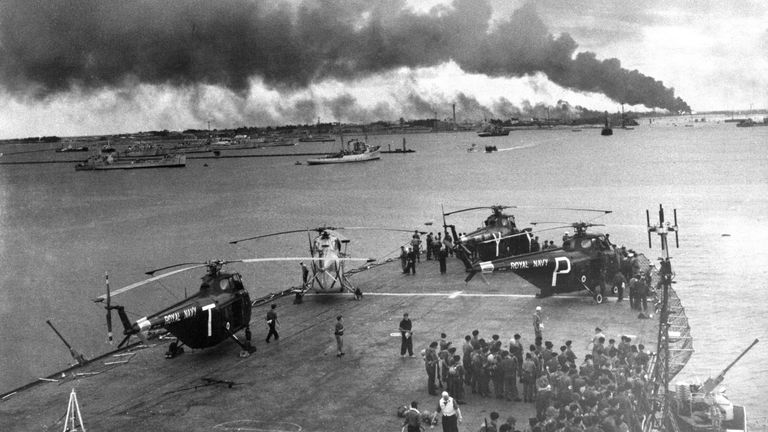Imagine the Shard wedged across Horse Guards' Parade and you begin to grasp the scale of the engineering challenge of unblocking the Suez Canal.
At 310m London's tallest building is actually a dwarf compared to the Ever Given, the 400m long container vessel jammed bank-to-bank across the 200m shipping lane that commercially, strategically and politically may be the most important on the planet.
How it got there will be the job of the decade for marine accident investigators, not to mention the interview of a lifetime for the captain.
But as a fleet of tugs and excavators began trying to nudge and dig the mammoth ship out of its jam, the potential cost of this mishap was being calculated around the world.
As tankers queued in the Red Sea and the Mediterranean waiting to hear when and if they might pass through, oil prices rose on markets uncertain about how long they might be delayed.
The canal has long been the primary route for fuel both from the Gulf states bound for Europe and from Russia, via Crimea, to east Asia.
It is also crucial to distribution of manufactured goods from China to Europe.
Inside the tens of thousands of containers on the deck of the Ever Given and every ship it is holding up will be all manner of items bound for delivery on several continents.
For a global trading system already thrown out of synch by more than a year of COVID-19, it promises more disruption.
Around 50 ships pass through the canal every day, traffic that accounts for 12% of world trade.
They enter in convoys coordinated to pass each other in a new two-channel section opened in 2015 to better handle more vessels.
Dr Laleh Khalili, Professor of International Politics at Queen Mary University of London and author of Sinews of War & Trade, says prolonged closure could cause profound disruption.
"There are about 50 ships that go through the canal north and south every day, and because these are massive ships that is an enormous amount of trade; millions of gallons of oil, millions of tonnes of manufactured goods, hundreds of thousands of containers are going through the canal in any given week," she said.
"The longer the canal is closed the longer those convoys end up becoming, and the slower they become.
"If a ship's schedule is delayed by being stuck in the Red Sea it might be that it loses its scheduled berthing time at the port at which it arrives, so it has knock on effects beyond the Suez Canal itself."
Dug largely by forced labour and opened in 1869, the canal transformed trade by allowing navigation between Europe to Asia without the lengthy and perilous journey around the Horn of Africa.
Britain had opposed construction because of the impact it would have on its established trade routes, but became a shareholder and went to war over it in 1956, invading the Sinai alongside French and Israeli troops after President Nasser nationalised the canal.
Forced to withdraw by pressure from both the USA and USSR, the expedition cost Britain influence and international reputation, but the canal reopened within 18 months.
It was closed for almost eight years following the 1967 Arab-Israeli war, with the 'Yellow Fleet' vessels and crew stranded in canal for much of that time.
That prolonged closure, forcing shipping back around Africa, was one of the factors in the development of mega-ships, but mercantile self-interest has kept the canal open for the 45 years since.
Dr Khalili says this latest episode serves as a reminder that the canal matters.
"During every single period there's been a reason why the canal has been so crucially important.
"When it first opened it allowed the British and the French to consolidate their imperial holdings in Asia and Africa.
"When it was nationalised by Egypt it became an enormous source of income for the country.
"When oil was discovered in vast quantities on the Arabian peninsula and the Persian Gulf it became the primary route through which oil was transported to Europe.
"Now because China is perhaps the single most important location for manufactured goods it is one of the most important routes for their transport to the Mediterranean, and also the ports in north eastern Europe on the North Sea and the Atlantic."
https://news.google.com/__i/rss/rd/articles/CBMiamh0dHBzOi8vbmV3cy5za3kuY29tL3N0b3J5L3doeS10aGUtY29zdC1vZi1zdWV6LWNhbmFsLW1pc2hhcC1pcy1iZWluZy1jYWxjdWxhdGVkLWFyb3VuZC10aGUtd29ybGQtMTIyNTU3MTXSAW5odHRwczovL25ld3Muc2t5LmNvbS9zdG9yeS9hbXAvd2h5LXRoZS1jb3N0LW9mLXN1ZXotY2FuYWwtbWlzaGFwLWlzLWJlaW5nLWNhbGN1bGF0ZWQtYXJvdW5kLXRoZS13b3JsZC0xMjI1NTcxNQ?oc=5
2021-03-24 21:11:24Z
52781457758414



Tidak ada komentar:
Posting Komentar